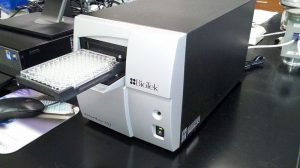
In a paper recently published in Biochemistry, a group of University of Pennsylvania Bioengineering students describe the results of their work designing a new, open-source, low-cost microplate reader. Plate readers are instruments designed to measure light absorption and fluorescence emission from molecules useful for clinical biomarker analyses and assays in a diverse array of fields including synthetic biology, optogenetics, and photosensory biology. This new design costs less than $3500, a significantly lower price than other commercially available alternatives. As described in the paper’s abstract, this design is the latest in a growing trend of open-source hardware to enhance access to equipment for biology labs. The project originated as part of the annual International Genetically Engineering Machine Competition (iGEM), an annual worldwide competition focusing on “push[ing] the boundaries of synthetic biology by tackling everyday issues facing the world” (iGEM website).
The group consists of current junior Andrew Clark (BSE ’20) and recent graduates Karol Szymula (BSE ’18), who works in the lab of Dr. Danielle Bassett, and Michael Patterson (BSE ’18), a Master’s student in Bioengineering and Engineer of Instructional Laboratories. Assistant Professor of Bioengineering Dr. Brian Chow served as their faculty mentor alongside Director of Instructional Labs Sevile Mannickarottu and Michael Magaraci, a Ph.D. candidate in Bioengineering, all of whom serve as co-authors on the published article. The research and design of the project was conducted in the Stephenson Foundation Bioengineering Educational Laboratory here at the University of Pennsylvania’s Department of Bioengineering.
